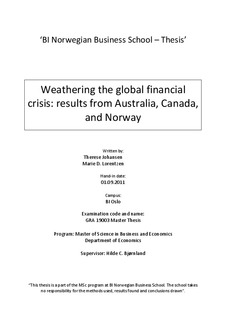| dc.description.abstract | This thesis examines how some countries have performed above average during the global financial crisis. In order to study this Australia, Canada, and Norway have been selected. We investigate whether the industry structure in the countries were an important factor to their resilience during the recent financial crisis, if the use of monetary- and fiscal policy has contributed to their resilience, and if there are any characteristics in the three countries financial systems where they stand out. Comparable time series data and country characteristics have been used to compare the three countries. We relate our findings with OECD countries to evaluate their performance, and also to see if there are any differences as well as similarities. Further, a structural vector autoregressive (SVAR) model analysis has been conducted to find out if there is a positive relationship from an increase in the terms of trade on real gross domestic product (GDP) and the current account in the respective countries. The results show that the resilience of Australia, Canada, and Norway partly can be explained by their favorable macroeconomic position compared to other OECD countries at the onset of the crisis. This position was a result of a combination of limited dependence on the hardest hit segments of global manufacturing together with a commodity-based industry. They have mainly benefited from the strong economic growth in commodity importing countries like China and other Asian countries and high prices for energy and mineral export. Furthermore, Australia, Canada, and Norway were able to stimulate the real economy through monetary- and fiscal policy measures. Moreover, while the financial sector was heavily affected internationally, the financial systems in Australia, Canada, and Norway showed relative resilience due to factors like healthy regulation and supervision, limited exposure of structured products and a more conservative attitude in financial institutions. | no_NO |
